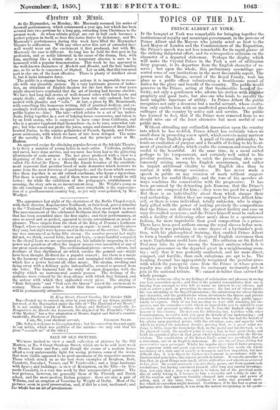Otairts ttei Aittoir.
At the Haymarket, on Monday, Mr. Macready resumed his series of •, farewell performances, which commenced a year ago, but which has been severed into two portions by a long gap, extending from Christmas to the present week. As when certain polypi are cut in half' each becomes a ' perfect polypus in itsel4 so does this series thrive by dichotomy, and Mr.'' Macready's performances during this week have filled the Haymarket Theatre to suffocation. With any other actor this sort of extended fare- well
would wear out the excitement it first produced, but with. Mr. Macready the case is different. So long has he held the first post in his profession, and so nobly laboured in the cause of the drama, that, with him,- anything like a return after 'a temporary absence is sure to be honoured with a popular demonstration. This week he has appeared in the well-known characters of Macbeth and Hamlet; and the less familiar one, as far as he is concerned, of Shyloek. Let us add, that this less usual part is also one of the least effective. There is plenty of intellect about it, but it lacks intensive force. The. public is a strange being, whose actions it is impossible to recon- cile with any plausible system. By a very legitimate process of induc- tion, an attendant of English theatres for the :last three or four,years might almost have concluded that the art of hissing had become obsolete. We have had long dull.stories of well-dressed rakes with bad hearts and empty skulls ; and their exploits have been not only endured, but ho- noured with plaudits and " calls." At last, a piece by Mr. Bourcicault, with something like humorous writing, full of practical• drollery, and ex- ceedingly well acted, makes its appearance' and the universally-t lerating public begins to—hiss! The tale—which relates to a set of lax indivi- duals, living together in a. sort of lodging-house communism, and taken in by an Irish scamp, who is supposed to have come from California, and who is a greater vagabond than themselves—is, to be sure, somewhat vul- gar; but who would not prefer the jokes, songs, and dances of these light- hearted Parias, to the sombre gallantries-of French, Spanish, and,Portu- guese aristocrats,. with which we•have of late been deluged. The name of the novelty is The 'Irish Diamond, and the principal . actor is Mr. Hudson.
An approved recipe for obtaining popular favour at the Adelphi Theatre is to dress a number of young ladies in male, attire. 'Uniform; military and naval, have done service, and recourse • has been had to the glittering allurements of scale armour. The last. piece produced with a view to a disguising of this sort is a tolerably smart farce, by Mr. Mark Lemon, called The School for Tigers. Here the female beauties of the establish- ment represent that peculiar breed of male domestics which borrows • its name from the most ferocious of quadrupeds ; and the focus which assem- bles.'them together is an old . retired coachman,. who keeps a tiger,class. Plot there is scarcely any, and if there were none at all it would be still better ; for while the exhibition of the pedagogue's establishment is amusing, the story acts as an inconvenient drag. Mr. Wright's pomp as the old coachman is excellent ; still more remarkable is the .representa- tion of a goodhumoured country boy, as yet only semi-polished, by Miss. Woolgar.


























 Previous page
Previous page